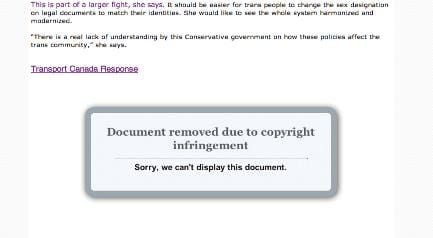
Credit: Screencap
UPDATE: Feb 5 – Xtra has obtained a copy of the copyright infringement takedown notice sent by Transport Canada to Scribd.
Under the United States’ Digital Millennium Copyright Act of 1998 (DMCA), by which the San Francisco–based Scribd is bound, a website must immediately remove any document or file upon receipt of such a notice from a copyright holder. The company is not legally allowed to evaluate the merits of such a notice, only the completeness of the information provided on it. Jason Bentley, in charge of copyright issues for Scribd, told Xtra, “Since the claim affidavit met all criteria for validity under the DMCA, we were required by law to remove the content.”
Scribd is a document-hosting service that is used by Xtra and many other news outlets to easily share original documents in their entirety. Documents are uploaded to Scribd’s servers and then can be embedded in other web pages.
The takedown notice was filed by Transport Canada senior communications advisor Maryse Durette and concerned on-the-record email correspondence between her and an Xtra reporter. (Xtra has since pasted the text of those emails onto this page, in place of the embedded Scribd document.)
“This wasn’t a copyright claim at all, but they used copyright legislation to get it removed,” said Michael Geist, a University of Ottawa professor who holds the Canada Research Chair in Internet and E-Commerce Law and who is an expert in copyright legislation, on Feb 1.
The relevant section of Durette’s notice states:
“I am the author of a letter to a reporter, that has now been posted on Scribd.
My personal info being violated by material available upon your site at the following URL(s): http://www.scribd.com/doc/80006767/Transport-Canada-Response.
The letter was sent to reporter as info not for publication as is, including my phone number, available to anyone to use. I have since been the target of hateful phone messages.
I have a good faith belief that the use of this material in such a fashion is not authorized by the copyright holder, the copyright holder’s agent, or the law; I state that the information contained in this notification is accurate.”
Contact information — and certainly not the contact information of a government official — is not subject to copyright, Geist said. Nor is this specific information private, as it is publicly displayed in the Government of Canada’s online employee directory.
Although emails may indeed be subject to copyright, because Durette is a government employee who authored these messages as part of her job, they are subject to Crown copyright. And works subject to Crown copyright may be reproduced for public non-commercial purposes. (In this context, “non-commercial” means the work isn’t being sold.)
For Geist, the DMCA represents a “shoot first and aim later” approach, under which a mere allegation of copyright infringement is sufficient to have content removed from the web.
“That’s the problem with these systems and why we have to guard against them coming in to Canada. [Scribd’s] obligation is simply to respond. If they intervene, that’s when they face potential liability,” Geist said.
“That’s US law. One lesson we should take from this situation is not emulating those laws here in Canada.”
The DMCA also provides for a counter-notification mechanism, through which the person or organization that posted a document can contest an infringement claim and have a document restored.
Feb 2 – Online file hosting service removes Xtra document after complaint
A spokesperson for Transport Canada says the federal office asked for a document to be removed from Xtra’s website because it contained the direct phone number for one of its media relations spokespeople, a number that is publicly available online. Xtra had uploaded the document to Scribd, a popular free online service for hosting files and embedding them into web posts.
Ministry spokesperson Maryse Durette submitted a copyright claim under the US’s Digital Millennium Copyright Act (DMCA) to San Francisco–based Scribd on Feb 1. Shortly afterward, Scribd removed the document from its website, citing “copyright infringement.”
“We try to limit the calls to media folks,” says the ministry’s media relations manager, Patrick Charette. “[Durette] is not a public inquiry person. She is a media relations person.”
The document contained email correspondence between Durette and Xtra’s reporter about a story relating to federal changes to flight regulations that activists say target transgender Canadians and could prevent them from boarding flights. The contact information is in Durette’s email signature line.
So why not just call the reporter to have the phone number removed?
“[Durette] took it upon herself late yesterday to contact Scribd. The issue should have been dealt with directly with you,” says Charette.
Durette told staff at Scribd that the information was private. In fact, as a spokesperson for a federal ministry, her information is public.
“You’re right, it’s public. We are an office of the government,” Charette says. “We ask reporters to limit the publication of direct phone numbers and email addresses. We can’t manage calls from the public.”
Charette stressed repeatedly that the removal had nothing to do with the content. “I agree, this could have been done a different way,” he says.
Scribd spokesperson Michelle Laird says Scribd is investigating the matter.
Michael Geist, a University of Ottawa professor who holds the Canada Research Chair in Internet and E-Commerce Law, and who is an expert in copyright legislation, calls the situation “problematic.”
“So they used copyright claim legislation to get information removed that wasn’t a copyright claim at all,” he says. “They are essentially running counter to their own licence, which gave you the right to post that for public, non-commercial purposes.
“The over-broad use of these rules is exactly the kind of concern that many Canadians have raised. They are concerned that copyright reform may result in arbitrary takedowns of content. We need to guard against that. That has been the prime criticism of how the US system works, where there can be these arbitrary takedowns, and that sounds exactly like what happened here.”
While speaking to Xtra on the phone, Geist did a web search and easily found Durette’s direct phone number on the Transport Canada website.
“I just searched and found the 613-998-8344 easily. It’s all there,” he said. “It’s false for her to say that information isn’t otherwise publicly available. It’s very public. I found it in 10 seconds while talking to you.”

 Why you can trust Xtra
Why you can trust Xtra


